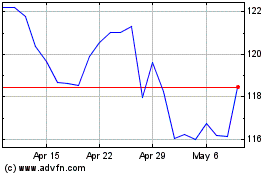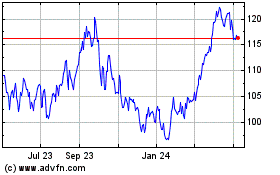Exxon, Chevron Fall Short Despite Rising Prices -- Update
February 02 2018 - 10:53AM
Dow Jones News
By Bradley Olson and Allison Prang
America's biggest oil companies surprised investors with
quarterly profits that missed expectations stoked by rising crude
prices.
Exxon Mobil Corp. and Chevron Corp. Friday reported quarterly
net income of $8.4 billion and $3.1 billion, respectively. But most
of the gains stemmed from one-time benefits related to the tax
changes approved by Congress and signed into law by President
Donald Trump late last year.
Exxon said its production fell by about 130,000 barrels a day,
and the company reported a $1.3 billion write-down on its natural
gas properties, the second year in a row it has had to recognize
the declining value of certain prospects.
The company lost money in its U.S. drilling business for the
12th quarter in a row, showing continued problems in an area where
it is planning a vast expansion. Earlier this week, Chief Executive
Darren Woods said the company would triple its production in the
red-hot Permian basin in Texas and New Mexico, investments it said
were "enhanced" by the tax overhaul.
"The U.S. results were disappointing," said Brian Youngberg, an
analyst with Edward Jones in St. Louis. "Production declines are a
continuing challenge for this company. They need to jump-start the
growth for investors to get excited again."
The Exxon and Chevron results were in contrast to the companies'
big oil counterparts, whose executives have said that rising prices
have led them to expect 2018 to be the best year since crude sold
for more than $100 a barrel.
Royal Dutch Shell Plc saw profits triple, nearing levels last
seen before oil prices crashed in 2014. ConocoPhillips said net
income was $1.6 billion, the highest in three years.
Even as the biggest U.S. companies fell short of expectations,
the sector is likely to generate more cash in 2018 than they did
during some period of the boom era when oil sold for more than $100
a barrel, according to Simmons & Co. The amount of cash in
excess of new spending and dividends could approach $40 billion in
2018, the most in more than a decade, according to the
analysis.
Healthy global economic growth has created solid demand for oil,
pushing up profits all over the world for refining oil into
gasoline and other products. In some areas, those margins are set
to surge by as much as 15% in 2018, according to Evercore ISI,
above levels that were already near records.
Exxon reported a more than $8 billion profit in the last three
months of 2017 as it recorded a $5.94 billion benefit from the new
tax law. That was up from earnings for the same quarter a year ago
of $1.68 billion, or 41 cents a share.
On an adjusted basis, which omits the bump from the new tax law
and impairments, earnings fell 2.2% to $3.73 billion, or 88 cents a
share. Analysts polled by Thomson Reuters were expecting adjusted
earnings per share of $1.04.
Chevron earnings rose more than sevenfold from a year ago, but
primarily because of the tax benefit. Net income rose to $3.11
billion, including a $2.02 billion benefit related to tax
legislation.
Shares of Exxon fell 5% in Friday morning trade, the most in
seven years. Chevron shares dipped 3.5%.
Write to Bradley Olson at Bradley.Olson@wsj.com and Allison
Prang at allison.prang@wsj.com
(END) Dow Jones Newswires
February 02, 2018 10:38 ET (15:38 GMT)
Copyright (c) 2018 Dow Jones & Company, Inc.
Exxon Mobil (NYSE:XOM)
Historical Stock Chart
From Mar 2024 to Apr 2024

Exxon Mobil (NYSE:XOM)
Historical Stock Chart
From Apr 2023 to Apr 2024
